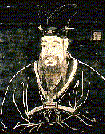| III. The Historical Problem Faced By Confucius. |
|
A. The Immense power and change wrought by
Confucius is
very difficult to understand. |
|
|
1. The collection of sayings seem so plain and
commonplace. |
|
|
2. There is very little that one can object to in
his sayings. How, then, can George Barton call Confucius the most influential man in the
whole history of China? |
|
B. The answer lies in the answer to the question:
How do you bring to an end interminable warfare in a society? Or, more positively,
what holds society together? What is it that provides social cohesion? |
|
C. Suppose you've had a culture for thousands of
years (3,000 BC) and tradition no longer holds it together. How do you overcome the rise
of individualism? |
|
|
1. The Realists: (known
only through Confucian historians) Han Fei Tzu (hun fay dzuh) |
|
|
|
a. Similar to our own Hobbesian tradition: nature
is red in tooth and claw; life is nasty, brutish, and short. |
|
|
|
b. Ultimately, order is based on force: reason
and morality sound good, but in the end, force prevails. |
|
|
|
c. Punishment should be heavy. |
|
|
|
d. Philosophical implications for human nature: |
|
|
|
|
(1) Man's lower impulses dominate him; people are
lazy. |
|
|
|
|
(2) People act from self-interest and their
strongest desire; they are egoists. |
|
|
|
|
(3) It must pay to be moral; order must come from
outside. |
|
|
|
|
|
This philosophy does not imply there are no pangs
of regret. E.g., Han Fei Tzu (quoted in The Way and Its Power) wrote to his son: |
|
|
|
|
|
|
No lake so still but that it has a wave,
No circle so perfect but that it has a blur,
I would change things for you if I could;
As I can't, you must take things as they are |
|
|
2. Mohism (mo ism):
utilitarianism; philosophy of love; Mo Tzu (mo dzuh). |
|
|
|
a. The answer to the problem is not force, but
love--love all equally. |
|
|
|
b. Calamities arise out of lack of mutual love.
Love others as yourself; love begets love; hate begets hate. |
|
|
|
c. Mohism was ultimately religious. The universe
is good as created by the Sovereign on High (a personal God). |
|
|
|
d. People should love others as they love their
own families and states. |
|
|
3. Confucius' genius: return to the roots
of society. Tradition is shifted to a conscious base: the education of moral ideal
and setting up patterns of prestige. |
|
|
|
a. Rejection of Han Fei Tzu's Realism: |
|
|
|
|
(1) Force does not compel people to be friendly. |
|
|
|
|
(2) You cannot legislate or compel morality;
inconsistencies will come out. |
|
|
|
b. Mohists answer of love is too utopian.
Different situations require different responses. |
|
|
|
|
(1) Mohism is too impractical--you can't treat
your friends and your enemies the same way. |
|
|
|
|
(2) Trace out the implications in your own life. |
|
|
|
c. If we suggest the cultivation of reason,
Confucius would reject that as well. |
|
|
|
|
(1) Reason and verbal instruction do not give
commitment. |
|
|
|
|
(2) Powerful rhetoric will move people far more
than reasoned discourse. |
|
|
|
d. Confucius' Answer: return to your
roots--get back to tradition. |
|
|
|
|
(1) The old unconscious traditions are too remote
and would not appeal directly to the new individualists. |
|
|
|
|
(2) So the tradition was reinterpreted and
modified to appeal to the best of that society--a political masterstroke. |
|
|
|
|
(3) Education of the moral ideal. Moral
ideas were driven into people by every possible means: temples, theatres, homes, toys,
proverbs, schools, stories, parades... until they became a habit. |
|
|
|
|
|
(a) If effect, what was set up were "pattern
of prestige"--the making of a superior individual and having people emulate him. |
|
|
|
|
|
(b) A second nature was developed--of what you
are, of what you are living for, of what you become. |
|
|
|
|
|
(c) These patterns become an inner imperative and
an engrained habit. |

